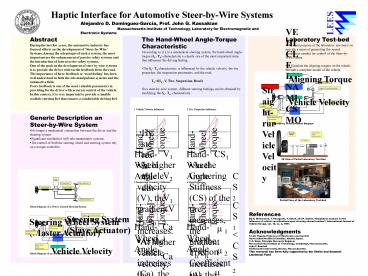Laboratory Testbed - PowerPoint PPT Presentation
1 / 1
Title: Laboratory Testbed
1
Haptic Interface for Automotive Steer-by-Wire
Systems
LEES
Alejandro D. Dominguez-Garcia, Prof. John G.
Kassakian Massachusetts Institute of Technology,
Laboratory for Electromagnetic and Electronic
Systems
- Laboratory Test-bed
- The main purpose of the laboratory test-bed is to
provide a mean of generating the sensed
parameters needed for control of the
Steer-by-Wire system. - To Simulate the aligning torques on the wheels
through a complete model of the vehicle dynamics.
- The Hand-Wheel Angle-Torque Characteristic
- According to 1, in a mechanical steering
system, the hand-wheel angle-torque (?h - Th)
characteristic is clearly one of the most
important items that influences the driving
feeling. - The ?h - Th characteristic is influenced by the
vehicle velocity, the tire properties, the
suspension parameters, and the road. - In a steer-by-wire system, different steering
feelings can be obtained by modifying the ?h - Th
characteristic.
Abstract During the last few years, the
automotive industry has focused efforts on the
development of Steer-by-Wire Systems. Among the
advantages of such a system, the most important
are the enhancement of passive safety systems and
the introduction of lateral active safety
systems. One of the goals in the development of
steer by wire systems is to provide the driver
with tactile feedback from the road. The
importance of force feedback or road feeling
has been well understood in both the
tele-manipulator systems and the automotive
field. Force feedback is one of the most valuable
parameters in providing for the driver with
accurate control of the vehicle. In this context,
it is very important to provide a tunable
realistic steering feel that ensures a
comfortable driving feel.
Thf(?h , V, Tire, Suspension, Road)
1 Vehicle Velocity Influence
2 Tire Properties Influence
- Generic Description an Steer-by-Wire System
- No longer a mechanical connection between the
driver and the steering system. - Significant similarities with tele-manipulator
systems. - The control of both the steering wheel and
steering system rely on a unique controller.
- At higher vehicle velocity (V), the gradient
Th/?h increases. - At higher vehicle velocity, the hysteresis width
of the Hand-Wheel Torque for zero Hand-Wheel
Angle becomes narrower.
- As the Cornering Stiffness (CS) of the tire
increases, the gradient Th/?h increases. - As the Cornering Stiffness, the hysteresis width
of the Hand-Wheel Torque for zero Hand-Wheel
Angle increases.
3 Suspension Geometry Influence
4 Road Influence
Partial View of the Laboratory Test-bed
Block Diagram of a Power Assisted Steering System
References 1 H. Shimomura, T. Haraguchi, Y.
Satoh, and R. Saitoh, Simulation analysis on the
influence of vehicle specifications upon steering
characteristics, International Journal of
Vehicle Design, vol. 12, no. 2, 1991.
Acknowledgments F. Luis Pagola, Professor of
Electronics and ControlUniversidad Pontificia
Comillas, Madrid, Spain. T. A. Keim, Principle
Research Engineer
Massachusetts
Institute of Technology, Cambridge,
Massachusetts. John F. Banzhaf
Northeastern University, Boston,
Massachusetts. This research has been fully
supported by the Sheila and Emanuel Landsman Fund
- As the Caster increases (Ca), the gradient Th/?h
increases. - As the Caster increases, the hysteresis width of
the Hand-Wheel Torque for zero Hand-Wheel Angle
decreases.
- As the Friction Coefficient (?) between the tire
and the road increases, the gradient Th/?h
decreases. - As the Friction coefficient between the tire and
the road increases, the hysteresis width of the
Hand-Wheel Torque for zero Hand-Wheel Angle
becomes narrower.
Block Diagram of an Automotive Steer-by-Wire
System

